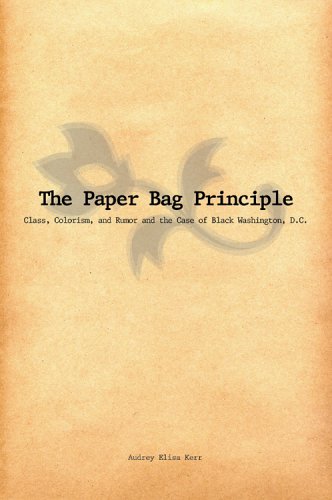The paper bag principle
Class, colorism & rumor and the case of Black Washington, D.C
Audrey Elisa Kerr
BOOK REVIEW

In the tapestry of societal constructs woven throughout history, The Paper Bag Principle: Class, Colorism & Rumor and the Case of Black Washington, D.C. by Audrey Elisa Kerr emerges as an electrifying examination of the intricate relationship between race, class, and perception. It is not simply a book; it is a shot across the bow of ignorance and complacency, daring you to confront the biases that lurk in the darkest corners of cultural identity.
Kerr delves deeply into the cultural phenomenon of colorism-a harrowing legacy rooted in our society's obsession with skin tone-and its stark impact on the lives of Black individuals in Washington, D.C. By illustrating how a mere paper bag-an innocuous object-has been weaponized as a symbol of privilege and exclusion, she sheds light on a pervasive issue that slices through communities like a hot knife through butter. The paper bag test-a criterion applied to judge someone's societal worth based on their skin tone-exposes the ugly truth of colorism and the scars it leaves on individuals within the community.
What makes Kerr's exploration particularly riveting is how she intertwines personal stories with a broader socio-political analysis. You are pulled into the narratives of those affected, witnessing firsthand the pain, confusion, and sometimes, the resilience that emerges from navigating a world that assigns worth based solely on the hue of one's skin. The emotional resonance of these stories is undeniable, hitting you where it counts. It is impossible to read without feeling a tear swell in your eye or a knot tighten in your stomach. 🥺💔
This book doesn't merely present facts; it invites you to vicariously experience the plight of its subjects. With every page, you witness the stark realities of life as they grapple with the intersections of class and race. Kerr masterfully engages your empathy, urging you to reflect on your own perceptions and biases. When she presents the case study of Black Washington, D.C., it is unfiltered and raw, forcing you to grapple with the prejudices that persist in even the most "civilized" circles of society.
But beyond the individual stories, Kerr's work invokes a broader discourse on how societal constructs and rumors shape our understanding of identity. The fear of stigma, the gossip that clings to those who don't fit stereotypes, becomes palpable as you turn the pages. This is not just an academic exercise; the stakes are perilously high. What is the cost of these constructs on community cohesion? What does it mean for a person who is judged by measure of a paper bag?
Readers have been torn in their opinions, some hailing Kerr's work as a groundbreaking revelation that confronts systemic issues head-on, while others critique it for being overly academic or challenging to digest. Yet, is it not the nature of revolutionary work to provoke? To ignite discontent? Critics argue this book may alienate readers who are unaccustomed to such frank discussions. But therein lies its power-Kerr doesn't serve comfort; she serves truth. This is not a light read, but it is necessary for understanding a facet of culture that remains shrouded in misunderstanding.
Kerr's exploration is timely, especially given the renewed conversations around race and privilege in contemporary society. The notions addressed in The Paper Bag Principle resonate with today's movements for equality, making it a critical read for anyone wishing to understand the undercurrents of contemporary race relations. As the nation grapples with its history, Kerr's insights beckon you to reconsider what has been passed down through generations, illuminating the insidious ways in which bias continues to live and breed.
Dare I say, skipping out on this illuminating read would be a disservice to yourself and the communities woven into the fabric of American society. When the pages of The Paper Bag Principle close, they leave behind not just the ink of a scholar but the somber echo of a reality that demands change.
So, ask yourself: What role do you play in this ongoing narrative? How will you contribute to reshaping perceptions and dismantling the barriers born from such archaic beliefs? The answers lie within the words of this sensational book, urging you to reflect, react, and, ultimately, rise. 🌍✨️
📖 The paper bag principle: class, colorism & rumor and the case of Black Washington, D.C
✍ by Audrey Elisa Kerr
🧾 136 pages
2006
#paper #principle #class #colorism #rumor #case #black #washington #audrey #elisa #kerr #AudreyElisaKerr